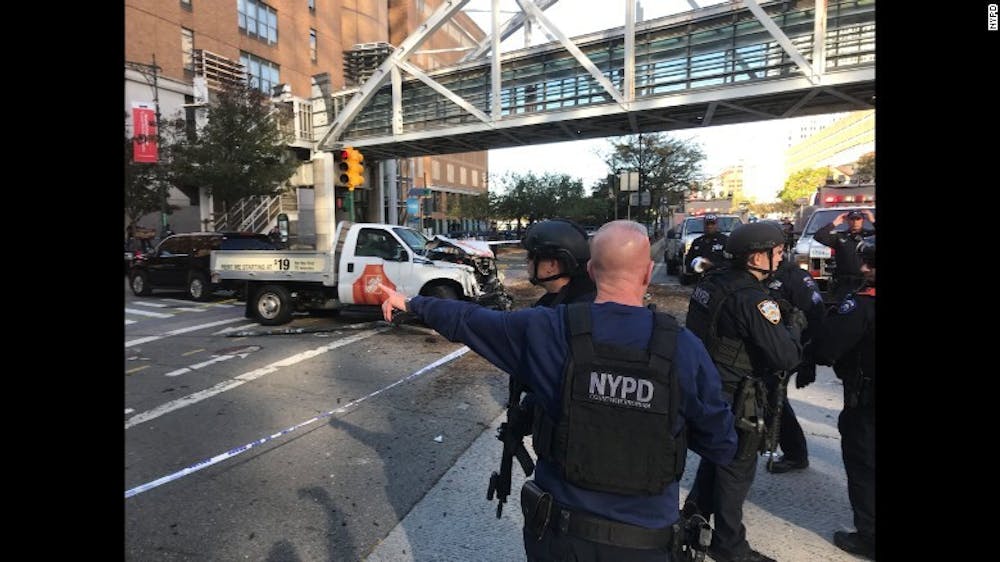Editor's note: some quotes in this article have been translated from Spanish to English.
At around 3 p.m. on Oct. 31, a truck drove through a Manhattan bike path, killing eight and injuring 11, according to the New York Times. The driver of the truck, Sayfullo Habibullaevic Saipov, immigrated to the United States from Uzbekistan in 2010 and had been living with his wife and three children in New Jersey before the attack, according to CNN.
“He did this in the name of ISIS,” John Milller, the New York Police Department deputy commissioner for intelligence and counterterrorism, said. This attack is classified as the second most deadly terrorist attack in New York City since 9/11.
The victims of the attack included two Americans, one woman from Belgium and five men from Argentina. The five men from Argentina were part of a group of 10 total, who had traveled to New York from Rosario, Argentina, for a high school reunion, according to the New York Times.
Within the United States, the news of the attack has passed fairly quickly, replaced by more current news, including the equally as shocking church shooting in Texas that occurred less than a week later.
Within Argentina, however, a country typically unfamiliar with terrorist attacks, the incident still remains frighteningly relevant.
“In Argentina, I don’t think people live with worry over acts of terrorism,” Karina Fernández, a professor of social sciences and languages at Universidad Católica de Argentina, explained.
She said that the lack of fear may have been connected to a “lack of consciousness of the danger.” While previously traveling in Istanbul, Fernández herself survived a terrorist attack and now always is aware of the danger, she said.
Julieta Marino Tartaglino, an Argentine student at UCA, agreed with Fernández.
“I don’t think the average Argentine is scared of terrorism since we’ve had so little international terrorism in our history,” Tartaglino said.
Tartaglino added that although she does not think tourism to the U.S. will decrease as a result of the attack, there will still be an increased feeling of insecurity on an international level.
International students from the U.S. currently studying in Buenos Aires, Argentina, have also been forced to reflect on watching an attack take place in their home country from afar.
Enjoy what you're reading?
Signup for our newsletter
For Meghann Lewis, a University of Richmond student studying at UCA, the most recent attack has made her realize that there is a stark contrast between the frequency of terrorist attacks in the U.S. and Europe compared to Argentina.
Even though she does not remember feeling nervous about terrorism in the past in the U.S. and has never worried about terrorism while in Argentina, she said she feels that when she returns home, terrorism is something she will now be more wary of.
Eimear Ryan, an exchange student at UCA from Cork, Ireland, has been forced to reflect on the high frequency of terrorist attacks in Europe.
She said she considers herself “lucky to be in South America right now instead of Europe” and said that terrorism was not something she worried about here. Despite the lack of current concern during her time in Argentina, her life will have changed when she returns home, she said.
“I would have gone on European trips two or three times a year before, but that has changed for me in recent times,” Ryan said.
David Brown, another UR student studying at UCA, said that he still felt the looming threat of terrorism while in Argentina.
Brown worked as an intern in Barcelona last summer, and when an attack occurred there shortly after he had left, he was shocked. Ever since, he’s thought twice about doing touristy things and will always consider the possibility of a terrorist attack, he said.
Brown also noted that the Jewish community in Buenos Aires was especially wary of an attack after there was a terrorist attack on a Jewish synagogue in 1994 thatkilled 85 and injured hundreds. Brown said when he went to a local synagogue recently, the security was similar to entering an airport.
Contributor Madison Sweitzer is currently studying abroad in Buenos Aires, Argentina. Contact Madison at madison.sweitzer@richmond.edu.
Support independent student media
You can make a tax-deductible donation by clicking the button below, which takes you to our secure PayPal account. The page is set up to receive contributions in whatever amount you designate. We look forward to using the money we raise to further our mission of providing honest and accurate information to students, faculty, staff, alumni and others in the general public.
Donate Now



